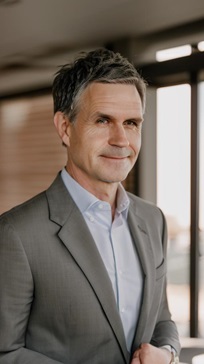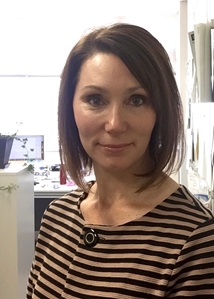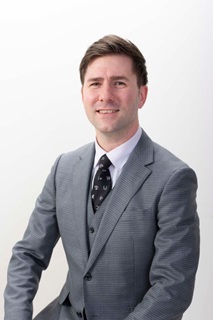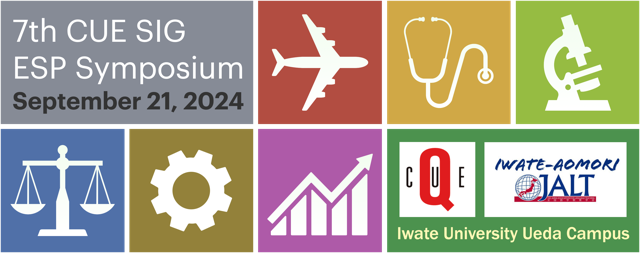7th CUE ESP Symposium 2024 at Iwate University - Ueda Campus
-
Introduction
Welcome to the 7th CUE Symposium 2024, held at Iwate University - Ueda Campus. I'm certain you will find this symposium to be intimate, engaging, and enriching for your experience. The plenary speakers and poster presenters will help you and assist you in your academic teaching and research practices. I hope you will gain a lot from this symposium. Thank you for attending and get ready to be inspired!
Sincerely,
Fred BacalaSymposium Chairperson
Sponsors: Iwate University, Pearson Japan KK, and Tryalogue Education
Access from Morioka Station
Detailed access from Morioka Station
From Iwate Daigaku Mae Bus stop to the venue
Pre-Symposium Dinner (you must register to attend)
Lunch Options
Hotels around Morioka Station
Tentative Symposium Schedule -
Plenary Speakers
The Plenary speakers will engage the audience with their presentation. It will be held in Ginga hall and the audience will be seated while listening to and participating with the speaker.
Here is some information about the plenary speakers:

Leigh McDowell is an associate professor at the Nara Institute of Science and Technology (NAIST) in Japan. NAIST is a national graduate university specialising in cutting-edge research in the three major disciplines of information science, bioscience, and materials science. Because of the international nature of these fields, NAIST students are expected to be able to use English productively in their research and future careers. In order to support this need, Leigh McDowell has been actively involved in the field in English for Specific Purposes (ESP) for over a decade with a particular focus on teaching and research in the sub-branch of English for Research Publication Purposes (ERPP). At the same time, Leigh has been an active member of JALT, volunteering as an officer with his local Nara chapter and a former member-at-large with CUE, helping the SIG establish the inaugural ESP Symposium in Kansai in 2012.
Mellisa Ogasawara has been teaching English in Japan for nearly 25 years, including 17 years at Aomori University of Health and Welfare. She has a keen interest in transforming students' passive vocabulary into active use. By incorporating strategies focused on passive vocabulary activation, Mellisa seeks to enhance her students' overall language proficiency.
Chris Horne has taught at Aomori University of Health and Welfare since 2012. Chris teaches general and professional English courses for first- and second-year nursing, physical therapy, social welfare, and nutrition students. Chris is interested in translanguaging and the overuse of Katakana words in Japanese.-
Plenary Session 1: Leigh McDowell (10:00am-11:00am)
PL1Teaching English for Research Publication Purposes in Japan
The field of English for Research Publication Purposes (ERPP) has emerged in recent decades from the larger disciplines of ESP and EAP to offer language teaching professionals a plethora of knowledge and resources to better help early-career L2 scholars in their development of competence and confidence in research writing. Drawing on the field of ERPP, along with the presenter’s own experiential insights from a career of teaching this specialised form of English in Japan, this presentation will guide participants through the thought processes and planning behind teaching a university course on research writing to the next generation of Japanese scientists. -
Plenary Session 2: Mellisa Ogasawara & Chris Horne (3:10pm-4:10pm)
PL2Holistic ESP Course Design
Designing ESP (English for Specific Purposes) courses requires a multifaceted approach that addresses students' specific language and communication needs within their professional contexts (Dudley-Evans & St. John, 1998). An effective ESP course must integrate language skills, professional knowledge, and cultural awareness to prepare learners for real-world interactions. However, traditional ESP course designs often focus solely on language development, neglecting the critical integration of subject-specific knowledge and cultural awareness necessary for professional competence (Hyland, 2006). This oversight can lead to difficulties in applying acquired language skills in real-world situations, highlighting the limitations of traditional methodologies in fully meeting learner needs. To overcome this issue, it is essential to conduct a detailed needs analysis that identifies the specific requirements of learners and the contexts in which they will use English (Basturkmen, 2010). This presentation will share our course design experience at Aomori University of Health and Welfare, providing valuable insights into optimising student learning outcomes and enhancing professional readiness.At Aomori University of Health and Welfare, our ESP course design prioritizes the holistic development of students. We begin with a comprehensive needs analysis, gathering detailed information from industry professionals, students, and academic staff to pinpoint specific language requirements, knowledge gaps, and cultural competencies required in their professional domains. The resulting curriculum not only focuses on language skills but also integrates subject-specific content and cultural awareness, ensuring a well-rounded educational experience. This needs analysis also lays the foundation for designing materials that precisely target these needs and reflect real-world scenarios and professional language use, making learning both practical and engaging. Our approach connects theoretical principles with real-world application, ensuring students are well-prepared for the demands of their future careers.
-
-
Poster Presentations
These presenters will give poster presentations to the audience. The audience will have the chance to walk around the room, and listen to and interact with the poster presenters. They are meant to help engage the audience with the presenter's poster and presentation. Please stop by the poster presenters during your time at the Symposium.
-
Poster Sessions Morning (11:10am-12:10pm)
PS1(Will be updated shortly, but for now, here is the tentative list of poster presenters.)
James Emmet Owens
Mani Ram Sharma
Neny Isharyanti
Kazumi Kato
Frederick Bacala
Julia Kimura / Elisabeth Fernandes
Colin Rundle -
Poster Sessions Afternoon (2:00pm-3:00pm)
PS2(Will be updated shortly, but for now, here is the tentative list of poster presenters.)
Kazumi Takagi
James Emmet Owens
Rachel Patterson
Dragana Lazic
Tosh Tachino
Sadie Nitta
Dax Thomas
Mariana Oana Senda
-

